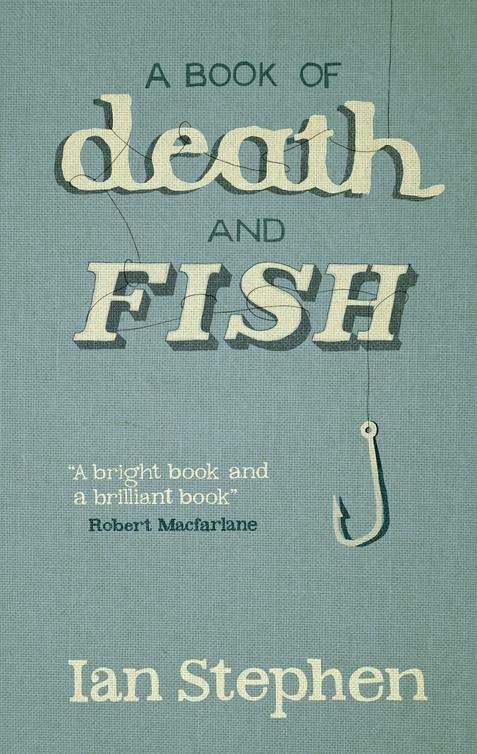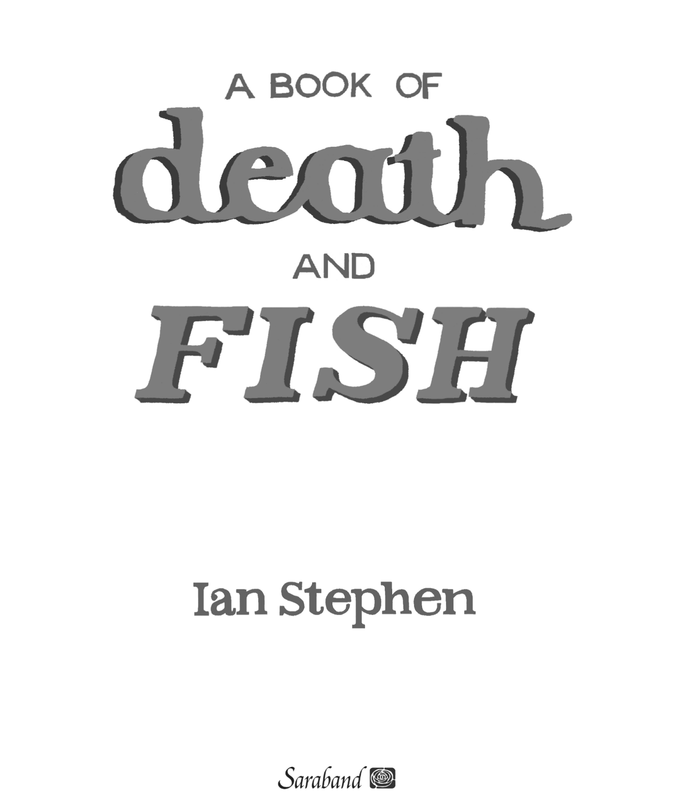A Book of Death and Fish
Read A Book of Death and Fish Online
Authors: Ian Stephen


“What a book, by what a writer! Here’s a novel – with shades of the memoir, echoes of the documentary – from a man soaked through by sea and story, about lives and the ways they take place (and the ways place takes them). Lives within lives, and stories within stories, intricately nested; or perhaps hung like hooks to snag the readers: ‘a few droppers dangling off the thread’. Line by line (thread by thread), the voices were so rich, so inventive, and the vision so sharp, that I relished each paragraph. It’s a bright book and a brilliant book, that surges with vigour.” -
Robert Macfarlane
“Some stories are shaped as though they are not a story at all but are charged with a content that would have its way with you anyway, irrespective of plot.
A Book of Death and Fish
is such a story – dense, compelling and wildly idiosyncratic, it’s a novel that splits the form open like a fresh catch, glistening and raw and singing with the sea.” -
Kirsty Gunn
“…there is a wealth of anecdote, creating a kind of patchwork quilt of narrative. The chronicle and the memoir elements combine quite well to realize a gritty portrayal of life on Lewis … Stephen’s poet’s eye for detail and his linguistic precision make for a strong sense of authenticity.” -
Brian McCabe, Scottish Review of Books
“
A Book of Death and Fish
calls to mind writers as different as Herman Melville, Mark Twain and Alistair MacLeod. Like
Moby-Dick, A Book of Death and Fish
combines compelling narrative with densely detailed but no less compelling chapters devoted to such mundane matters as building a boat, repairing a chimney and selecting roofing slates. (As in Melville, no metaphysics without physics.)” -
Robert Morace, Professor of English, Daemon College, Amherst, NY

T
HIS BOOK IS DEDICATED TO
N
ORMAN AND TO
M
AIRI
M
AC
D
ONALD
,
A FINE POET AND TEACHER
The excerpt below was first written as the lines for the character of a fisherman on a herring drifter in a large-scale community play, written by the late Norman M MacDonald and performed in the transit-shed, number one pier, Stornoway. It was later included in
Portrona,
a spirited novel which gathers together several strands from plays by MacDonald.
Always you stare at the purple water, looking for the smoking signs of the herring. It’s good when the water’s dark for then you can imagine it swimming with fish.
When the day’s clear you’re sailing over safe sandy bottom, nothing to be seen but the smooth green ground. A crab slides along sideways. A speckled plaice stirs up the sand like a puff of smoke, gone at once like blood in the water. Yes we like the deep indigo sea. Even though the colour also hides the rocks, it hides the fish from us, we say, planting the nets.
We say to each other, “They’re down there in shoals, millions. Soon they’ll be in our net, a year’s money in one night.”
After the psalm and the supper and the waiting, the hauling of the nets, the capstan turning, we shake out the gasping fish, the hold fills, the boy coils, coils in his wet cubbyhole, in his weaving world of black wet rope.
We turn for home. Portrona beckons in the pearl and gold dawn. The wind with us, she takes it, hear her hiss through the water. The Zulu boat heeling, straining boards and sheets and canvas.
Hear her chuckle past Tiumpan, Bayble Island, The Chicken. She heels so far, at The Beasts, herring slips from her decks back into the sea.
Arnish, Goat Island, Number One. Portrona Quay before us. We’re not the first but we’re not the last either.
from
Portrona –
a novel by Norman Malcolm MacDonald
(Birlinn, Edinburgh, 2000)
ONTENTS
- Title Page
- Dedication
- B
OOK
O
NE
: Migrations - Attic
- Providence
- Westview
- Stella
- Strandings
- Yarns
- Migrations
- The Move
- Ghillie
- Pike
- Torcuil’s Olman
- Andra
- The Swimmers
- East
- Quo Vadis
- The Dry Summer
- The News
- Bhalaich Ghriomsiadair
- Ruaraidh
- The Carranoch
- The Trolley
- The District
- Laws
- Thomas
- Peter
- Patterns
- Seagull
- Sine
- Fidelity
- The Brails
- Mairi Bhan
- Peter’s Fish
- Broad Bay
- A Letter from Köln
- Another Letter
- In Black and White
- Biology
- A Constitutional Question
- A Local Issue
- Emcee
- Peace and Plenty
- Ordnance
- The Gynaecologist
- Flights
- The Rescue of the VAT Man
- The Year of the Fathers
- West Side Mayday
- That Year Again
- In the Crit
- Offal
- Will and Testament
- B
OOK
T
WO
: Turbulence - The Twist
- Torcuil
- Torcuil 2
- Klondykers
- Reunions
- Brickwork
- Spare Parts
- Clinker
- Tante Erika
- Loss
- Shipwrecks
- Slate
- Paper On Slate
- Lax 1
- Willum’s Mary
- Noble Anvil
- Calbost
- Nine Pounds
- Anchors
- The Black Pram
- Steel
- A Funeral
- The Barvas Shore
- The Sister
- Rebirth
- Two Bridges
- Bridge Number Three
- Andra 2
- Analysis
- Emily
- Siller Morn
- Smoking
- 205
- Invitation
- Fabric
- Mapping
- Colonoscopy
- From: [email protected]
- From: [email protected]
- After a Storm
- Stoves 2 (verses 1 to 3)
- From: [email protected]
- The Dream
- Turbulence
- Ceramics
- Plagues
- Lead-Line
- In The Fish Shop
- A Liberal Consensus?
- Will and Testament (revised)
- The Business
- Cause of Death
- Executor’s Notes
- Acknowledgements
- About the Author
- Copyright
Seamus was renovating a place just up from Bayhead. Not a bad little town-house with a nice bay window. Enough space in the attic to make another small room. He needed a fit young cove like myself to swing a sledgehammer. He could shovel the debris out, bit by bit, in his own time, once I’d brought it down.
Seamus ran a Coastguard watch and took part in training the coast-rescue team. We got on. I did a couple of shifts with him, as an auxiliary, once I got my radio ticket. First day I learned to skin a rabbit. Learned a couple of other things from him as well. It was the done thing then, favour for favour between coastguards.
He issued me with the heavy sledge. He took up a dainty five-pound club for the tidying up. We were in our Coastguard boilersuits. Seamus pointed to the partitions which had to come down. Some of them were plasterboard but some were the older type of construction: plaster on a strapping of lath.
We got on with it. We had teacloths over our mouths and noses. Health and safety, late-Seventies style. Earlier in the decade you’d have had nothing at all.
We became possessed as we swung. The walls fell and the dust rose. I opened the skylight, which was about to be replaced by a larger Velux, and both of us gulped in air. It was all suddenly very quiet.
Some good wood here. Might be pitch-pine. You could smell the resin in the splintered bits. But we were horrified at how little time the demolition had taken.
‘Aye, it doesn’t take long to pull things down,’ Seamus said.
I thought of The Who and ‘Talkin bout my generation’. I also thought of Pete Townsend smashing up a beautifully built guitar, for dramatic effect. I was acting under instructions but I felt implicated.
I didn’t voice any of this. Instead I asked why the low attic was divided further, into stalls. I was thinking of the Arnol black-house. It wasn’t that different from other European peasant houses. The accommodation for animals was in touching and smelling distance. But this was an attic. It couldn’t have been for beasts.
He could see it all. The whole plan would have been simple. Tiers of bunks at both ends with a cubby-hole in the middle.
‘Look, that’s where the chimney’s bricked up. They’d have worked shifts, just like ourselves. That’s where they’d have done their cooking. One shift shoving some hot foot down, quick as they could so as not to lose their sleeping time. The kettle back on for the next folk. One lot would be out into the cold of the morning, the next fall into their warmed bunks. All the women packed tight in here, like herrings in a barrel.’
Seamus could decipher the system at a glance. But what would have happened from midnight Saturday to midnight Sunday? They wouldn’t have worked then.
‘I suppose half of the girls would walk out to their homes out of town. They didn’t think much of ten or fifteen miles back then. If the other half were from away, they’d have the bunks to themselves. Go together, arm in arm, to the kirk round the corner.’
He asked me to stay for a dram. But I wasn’t drinking then. And I wanted to get the dust out of my hair. Up the road, the olaid had a big fire on for the hot water. The new council houses still had an open fire but now you got the radiators off it.
I told her about the room with the bunks, over our fried chops. She came alive when I told her what Seamus said about the herring girls. This was where East and West Coast folk had come together. It all got joined up in the towns of Stornoway or Wick or up at at Baltasound, in Unst. The Baltic trade. That never really recovered from the First World War. She’d never seen the big days of it but she could say she’d caught the tail end.
She was on form.
My Broch grannie, her own mother, had been to Stornoway long before that Lewisman danced herself off her feet. ‘D’ye mind thon row o ornaments i the pre-fab i The Broch. Peterheid tae Yarmooth. Takin trains tae follow the fishin. Trying to save a few pound to send hame.’
Then it was saving up to get married. ‘Your grannie aye said she’d hid nae a baud life.’ Hard work but always amongst friends. She definitely mentioned Stornoway. It was a long time ago. Bayhead, Keith Street, Kenneth Street, Scotland Street – they were all full of attics like that. In between the barrel stores. Keith Street rang a bell. Now she thought of it, my grannie always said there was a lot of banter about being billeted so close to Al Crae, the undertakers.
My bit was done but Seamus asked me back. He’d finished the big sweep-up. The wallpapers were stripped, layers and layers of them. He pointed to the beams. The slants of light from the skylights were making them shine. There were waves and waves of lightly chalked names.
Dolly MacDonald, Garyvard. Ishbel Mary MacLeod, 12 Habost. Milly Strachan, Inverallochy. Henrietta Stephen, Brightsea, Fraserburgh.
And more and more.
I went home for a shot of my mother’s camera. A wee Olympus Trip. Easy to use. Some of the snaps were a bit blurred with the slow explosure. The olaid went through them all, a few days later. We never sighted the name she was looking for. Her eyes misted over just the same – a thing you didn’t see very often.
